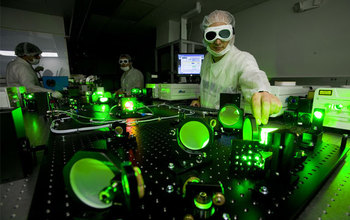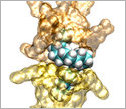News Release 14-093
NSF grants establish regional science and engineering collaborative consortia
About $18 million is being awarded to three regional consortia that will collaborate on science and engineering research, education, and outreach to accelerate progress on scientific grand challenges, strengthen workforce capabilities, and broaden the participation of underrepresented groups in science, technology, engineering and mathematics.

Investigating how light interacts with matter is the focus of the Nebraska-Kansas Consortium.
August 6, 2014
This material is available primarily for archival purposes. Telephone numbers or other contact information may be out of date; please see current contact information at media contacts.
The National Science Foundation (NSF) announced funding for three science and engineering research consortia that will forge regional partnerships in Nebraska-Kansas, Arkansas-Missouri, and Louisiana-Mississippi. Each consortium will receive Research Infrastructure Improvement (RII) Track-2 awards of up to $6M through NSF's Experimental Program to Stimulate Competitive Research (EPSCoR).
Collectively, these awards, which span six states, involve researchers from about 20 universities over a three-year period. The three RII Track-2 consortia are tackling nationally-important scientific challenges that range from molecular level investigations of individual electrons to advanced development of materials, genomics, and biotechnology. Each consortium will implement a unique suite of regionally-relevant activities for developing a scientifically literate workforce and broadening participation of underrepresented groups in science, technology, engineering and mathematics (STEM).
"These consortia will spur technological innovations that drive economic growth and develop a diverse STEM-enabled workforce" said Denise Barnes, Head of NSF's EPSCoR program.
A brief description of each consortium is provided below.
Nebraska-Kansas Consortium:
Imaging and Controlling Ultrafast Dynamics of Atoms, Molecules, and Nanostructures
PI: Fred Choobineh, University of Nebraska; Co-PI: Kristin Bowman-James, University of Kansas
The Nebraska-Kansas Consortium will apply ultrafast laser technologies at the intersection of photonics and electronics to investigate how light interacts with matter, one of the grand challenges of atomic, molecular, and optical (AMO) research. Physicists, chemists, and electrical engineers from Nebraska and Kansas will collaborate on imaging and controlling ultrafast dynamics of atoms, molecules, and nanostructures. The consortium will develop scientific, technological, experimental and theoretical tools that have applications in laser technology, solar energy capture, nanotechnology, and optogenetics (neuroscientific study of genetically light-sensitized neurons). Education, outreach, and workforce development activities will involve partnerships with small colleges in Nebraska and Kansas, summer workshops for high school physics teachers, and a host of programs for students.
Louisiana-Mississippi Consortium:
The Smart MATerial Design, Analysis, and Processing (SMATDAP) Consortium: Building next-generation polymers and the tools to accelerate cost-effective commercial production
PI: Michael Khonsari, Louisiana State University; Co-PI: John Hamilton, Mississippi State University
The Louisiana-Mississippi Consortium will develop new experimental and computational tools for accelerating development of smart polymers that have applications in medicine and material science. The interdisciplinary research team will apply molecular modeling and cyber control strategies across the lifecycle of polymer development from bench-top synthesis to product manufacture. The consortium will tailor the design of smart polymers to meet pressing needs in drug delivery, environmental remediation, and nanomaterials. Advances in the science of polymer characterization and materials synthesis will serve as a central theme for education and outreach activities that engage local schools, teachers, undergraduate and graduate students, and industry. By coordinating research with education and outreach, the consortium will work towards strengthening regional economic competitiveness through building a diverse STEM workforce.
Arkansas-MissourConsortium:
Plant Stress Response Through Innovations in Phenomics and Molecular Imaging Technologies
PI: Gail McClure, Arkansas Science & Technology Authority; Co-PI: John Walker, University of Missouri-Columbia
Researchers from Arkansas and Missouri will develop a Bioimaging Consortium to enable innovations in plant science that are relevant for food security and agricultural sustainability. Plant biologists will work with experts in radiochemistry, phenomics, and computational biology on solving a critical 21st century grand challenge: How can plants adapt to heat, drought, and other environmental or biotic stressors? By combining molecular imaging and tomography with phenotyping techniques, the Bioimaging Consortium will be able to overcome the limitations of traditional optical imaging to investigate and visualize plant physiology below and above the ground surface. The research team will generate new tools and discoveries to reduce impacts of drought, salinity, insects, and diseases on agricultural crop production. The Bioimaging Consortium will promote STEM education and workforce development through training activities for teachers, undergraduate and graduate students, and faculty members. Education and outreach will also include biotechnology industrial partnerships that can benefit the agriculture-based economies of Arkansas and Missouri.
About EPSCoR
EPSCoR is a program designed to fulfill NSF's mandate to promote scientific progress nationwide. Twenty-eight states, the Commonwealth of Puerto Rico, the U.S. Virgin Islands and Guam are currently eligible to participate. Through this program, NSF establishes regional partnerships with government, higher education and industry that effect lasting improvements in a state's or territory's research infrastructure and research and development capacity, and hence, its academic competitiveness.
-NSF-
-
Arkansas and Missouri researchers will work on innovations in plant science related to food security
Credit and Larger Version -
Antimicrobial responsive polymer surfaces studied at the University of Southern Mississippi.
Credit and Larger Version -
Simulation snapshot of cavitand dimer complex encapsulating nC22 alkane.
Credit and Larger Version -
Louisiana-Mississippi Consortium will tailor the design of smart polymers to meet pressing needs.
Credit and Larger Version
Media Contacts
Maria C. Zacharias, NSF, (703) 292-8454, email: mzachari@nsf.gov
Kimberly D. Osborne, NSF, (703) 292-2298, email: kosborne@nsf.gov
Program Contacts
Kelvin Chu, NSF, (703) 292-7860, email: kchu@nsf.gov
The U.S. National Science Foundation propels the nation forward by advancing fundamental research in all fields of science and engineering. NSF supports research and people by providing facilities, instruments and funding to support their ingenuity and sustain the U.S. as a global leader in research and innovation. With a fiscal year 2023 budget of $9.5 billion, NSF funds reach all 50 states through grants to nearly 2,000 colleges, universities and institutions. Each year, NSF receives more than 40,000 competitive proposals and makes about 11,000 new awards. Those awards include support for cooperative research with industry, Arctic and Antarctic research and operations, and U.S. participation in international scientific efforts.
Connect with us online
NSF website: nsf.gov
NSF News: nsf.gov/news
For News Media: nsf.gov/news/newsroom
Statistics: nsf.gov/statistics/
Awards database: nsf.gov/awardsearch/
Follow us on social
Twitter: twitter.com/NSF
Facebook: facebook.com/US.NSF
Instagram: instagram.com/nsfgov






